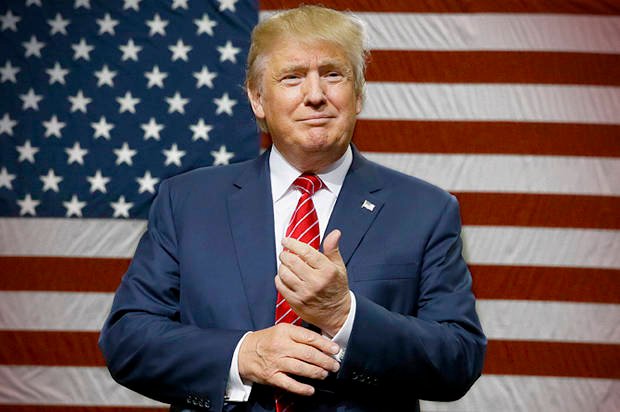In SF Gate,Politics - On June 6, 2016
By Deepak Chopra, MD

There's a powerful way to explain the rise of Donald Trump that most commentators have missed entirely or undervalued. The standard line describes Trump as a bizarre anomaly. Beginning as an improbable celebrity candidate, he has defied all the conventional rules of politics, which should have been fatal. Instead Trump has swept all before him on the Republican side. Possessing a "genius" for grabbing the limelight, he continues to dominate the scene in ways no previous politician ever has in modern times--so the conventional view goes.
But in reality Trump isn't bizarre or anomalous. He stands for something universal, something right before our eyes. It's an aspect of the human psyche that we feel embarrassed and ashamed of, which makes it our collective secret. Going back a century in the field of depth psychology, the secret side of human nature acquired a special name: the shadow.
The shadow compounds all the dark impulses--hatred, aggression, sadism, selfishness, jealousy, resentment, sexual transgression--that are hidden out of sight. The name originated with Carl Jung, but its basic origin came from Freud's insight that our psyches are dualistic, sharply divided between the conscious and unconscious. The rise of civilization is a tribute to how well we obey our conscious mind and suppress our unconscious side. But what hides in the shadows will out.
When it does, societies that look well-ordered and rational, fair and just, cultured and refined, suddenly erupt in horrible displays of everything they are not about: violence, prejudice, chaos, and ungovernable irrationality. In fact, the tragic irony is that the worst eruptions of the shadow occur in societies that on the surface have the least to worry about. This explains why all of Europe, at the height of settled, civilized behavior, threw itself into the inferno of World War I.
If Trump is the latest expression of the shadow, he isn't a bizarre anomaly, which would be true if normal, rational values are your only standard of measure. Turn the coin over, making the unconscious your standard of measure, and he is absolutely typical. When the shadow breaks out, what's wrong is right. Being transgressive feels like a relief, because suddenly the collective psyche can gambol in forbidden fields. When Trump indulges in rampant bad behavior and at the same time says to his riotous audiences, "This is fun, isn't it?" he's expressing in public our ashamed impulse to stop obeying the rules.
But the fun of world War I, which almost gleefully sent young men off to fight, quickly turned to horror, and the shadow closed an insidious trap. Once released, it is very hard to force the shadow back into its underground bunker. The Republican party has kept the shadow on a slow simmer for decades, ever since Nixon discovered how to make hay form Southern racism, law-and-order aggression against minorities, and us-versus-them attitudes to the Vietnam anti-war movement. In order to make themselves feel unashamed, the good people on the right found figureheads after Nixon who exuded respectability. The irony is that as with civilized societies that seem the least likely to allow the shadow to run free, the more benign a Reagan or Bush acted, the stronger the shadow became behind the facade.
Trump has stripped away the facade, intoxicated by the "fun" of letting his demons run and discovering to his surprise (much as Nixon did) that millions of people roared with approval. Yet by comparison, Nixon retained relative control over the forces he unleashed, while Trump may be riding a tiger--that part of the story has yet to play itself out.
If the shadow refuses to go back underground, which is always the case, what outcomes can we anticipate over the next six months? The present situation finds us trapped between denial and disaster. Denial is when you ignore the shadow; disaster is when you totally surrender to it. Without being at either extreme, right now many Americans feel the unsettling symptom of being out of control. Trump glorifies being out of control, and until this outbreak runs its course--which no one can predict--he will remain immune to all the normal constraints.
What to do in the meantime? A few things come to mind.
- See Trumpism for what it is, a confrontation with the shadow.
- Instead of demonizing him, acknowledge that the shadow is in everyone and always has been.
- At the same time, realize that the shadow never wins in the end.
- Find every opening to reinforce the value of returning to right and reason in your own life.
- Don't fight the shadow with the shadow, which means not stooping to play by Trump's nihilistic rules--he will always be willing to go lower than you are willing to go.
America has been fortunate in our ability to let off steam and recognize that we have demons. In the Great Depression bank robbers became folk heroes, but nobody suggested electing Bonnie and Clyde president. The rational constraints that allow for human evolution have been successful for millennia, as the higher brain became dominant over the lower brain. That dominance still holds good, no matter how close we flirt with the primitive areas of the mind. Trump represents something authentic in human nature, and in troubled times he's the bad boy who becomes a folk hero. No one can predict if his Wrong=Right stance will carry him to the White House. The contest with our own shadow isn't over yet.
Hi! I am a content-detection robot. This post is to help manual curators; I have NOT flagged you.
Here is similar content:
http://www.huffingtonpost.com/deepak-chopra/americas-shadow-the-real-_b_10319848.html
This is a good article. It is too bad you didn't write about it in your own words. The response to Trump is more than disturbing and it is interesting to see it expressed in terms that can be understood.